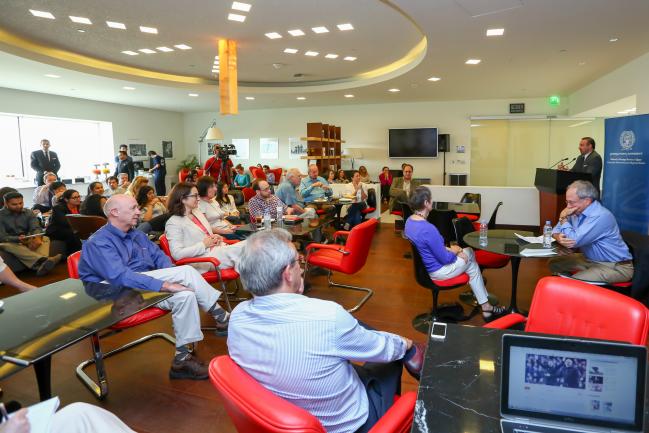American Studies, Dialogue Series, Distingushed Lectures, Race & Society, Regional Studies
Gary Wasserman Lectures on “Why Are We Here (in Doha)?”

Gary Wasserman, professor of Government at the Georgetown University School of Foreign Service in Qatar, delivered a CIRS Focused Discussionlecture titled, “Why Are We Here (in Doha)?” on April 27, 2014. Encouraging discussion among members of the Georgetown University in Qatar community, Wasserman noted that he did not have an answer to the question posed in the title of the lecture, but would offer five different possible models that approach an answer.
The first model is to consider Georgetown University in Qatar as an extension of the American imperium. In this model, the United States offers the Middle East region two of its key capabilities: military bases for regional security, and US schools providing world class education—in other words, what political scientists call hard power of economic wealth and military weapons as well as soft power of ideas. In this sense, Wasserman argued “we are the American superpower in its educational garb.”
These offerings are not necessarily negative and may be key to the current peace and prosperity in much of the world. The limitation to this model, however, is that the faculty and educators at Georgetown in Qatar do not necessarily serve as ideal ambassadors of US government policy. They are more likely to dissent, to question, and to challenge official US policy in their critical scribblings, and in their informed debates with students and others, whether at home or abroad. Moreover, the Qatari hosts are hardly a passive colonized people; they initiated this relationship, they pay for it, and they negotiate the contract under which Georgetown in Qatar operates, at the least as equals.
On the opposite end of the spectrum lies the second model offered by Wasserman—the “expat model.” Here, individual members of the Georgetown community travel abroad to practice their professions; a practical task that is not always integrated into that of any larger, more idealized notion of a Western institution. In this sense, he argued, “we are well-compensated hired help. We are here to fill a job and provide a service that cannot be produced locally; arguably a home-delivered prestige commodity—a Western brand name.” However, Wasserman’s objection to this model is that, whether consciously or not, Georgetown is expected to, and is in fact, changing behavior, as all educational institutions are wont to do.
The third model is the “contract model,” where Georgetown is obligated to act as a professional school for training diplomats in and for Qatar. The institution was invited by its Qatari hosts to offer some, but not all, aspects of the Georgetown college experience, sanitizing the more controversial elements of US culture and society. Wasserman’s reservations of this model center on the fact that very few of the graduates actually end up in the foreign service, and so the Georgetown education is far more encompassing than merely a training center for diplomats. “We are in fact as close to a liberal arts college as Education City gets,” he explained.
Which leads to the fourth model, that of “liberalism,” where Georgetown can be seen as spreading secular humanism in the form of the widest possible inquiry and tolerance of freedom of thought and expression, especially as for those who struggle with social oppression in terms of gender, race, or sexual orientation. However, Wasserman’s objection to the applicability of this model is that even though Georgetown invites students to think for themselves, the institution is in fact asking them to subscribe to a particular Westernized ideal of thinking. By being in Qatar, Georgetown must reconcile with the reality that it does not operate in a liberal society that elevates individual thought above all. Rather it is one where family, community, and religious ties are more highly valued. The students from this region are a complex mix of loyalty and obligation to their families and societies, along with a desire to integrate into globalizing outlooks and identities. This mixed campus experience makes it difficult for Georgetown to “cleanly” deliver the traditional Western ideals of liberalism. Nor should we, Wasserman stated.
The fifth and concluding model Wasserman offered is what he called “the muddled bubble.” In this model, Georgetown in Qatar is operating, without a set blueprint, in an environment of messy uncertainty. This, he argued, will necessarily mean that the institution is at the interface of different and changing cultures. “We occupy what should be an uncomfortable, unpredictable, but potentially innovative space,” he argued. The model of the bubble demands that Georgetown in Qatar seek a degree of autonomy, not only from potentially reactionary local pressures, but also from the foreign traditions and interests of the main campus. The “muddled” part of the model, he explained, comes from the experimental, unclear process by which we create an unusual blend of transnational students prepared for an unclear and unique future. Thus, Wasserman concluded, we should celebrate our unique position of being muddled “not by a clash of civilizations, but by a confusion of civilizations.”
Article by Suzi Mirgani, Manager and Editor for CIRS Publications.
Gary Wasserman has fashioned a career in teaching, political consulting and writing. Previously he taught graduate students at the Johns Hopkins School of Advanced International Studies in Nanjing, China. He received his Ph.D. with Distinction from Columbia University. He recently wrote Politics in Action: Cases in Modern American Government (2012), and Pearson is publishing the 15th edition of his text, The Basics of American Politics (2015). His MOOC, “The Game of American Politics,” is available online this spring.